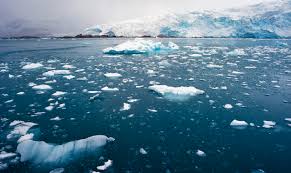The effects of global warming are increasingly evident in the Arctic region, as recent observations indicate a significant reduction in sea ice coverage. According to a recent report from the National Snow and Ice Data Center (NSIDC), the extent of Arctic sea ice in September 2023 reached its second-lowest level since satellite records began in 1979.
Record Low Ice Levels
The NSIDC data reveals that the average sea ice extent for September was 3.74 million square kilometers, significantly below the 1981-2010 average of 6.52 million square kilometers. This drastic reduction is attributed to the ongoing rise in global temperatures, which has accelerated the melting of polar ice caps.
Environmental Implications
Reduced sea ice levels have far-reaching environmental implications. The loss of ice habitat threatens the survival of Arctic species such as polar bears and seals. Additionally, the decrease in ice cover contributes to rising sea levels, which can lead to coastal erosion and increased flooding in low-lying areas.
Scientific Community’s Response
Scientists are calling for immediate action to mitigate the impacts of climate change. Efforts include reducing greenhouse gas emissions and transitioning to renewable energy sources. These measures are critical in slowing down the rate of Arctic ice melt and preserving the region’s fragile ecosystem.
Global Response and Policy Changes
The alarming data has prompted international discussions on implementing stricter environmental policies. Governments and organizations worldwide are urged to enhance their climate commitments under the Paris Agreement, aiming to limit global warming to 1.5 degrees Celsius above pre-industrial levels.
The continued monitoring and research by institutions like the NSIDC are essential in understanding the progression of climate change and its effects on the Arctic. The data serves as a crucial tool for scientists, policymakers, and environmentalists in their efforts to combat global warming.
Original Story at news.google.com
